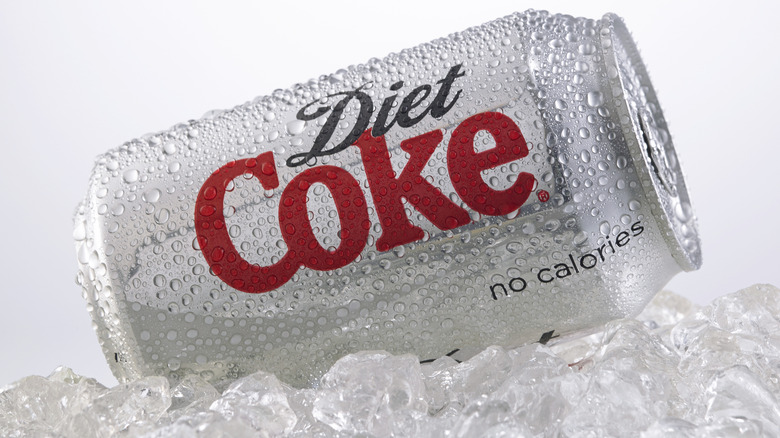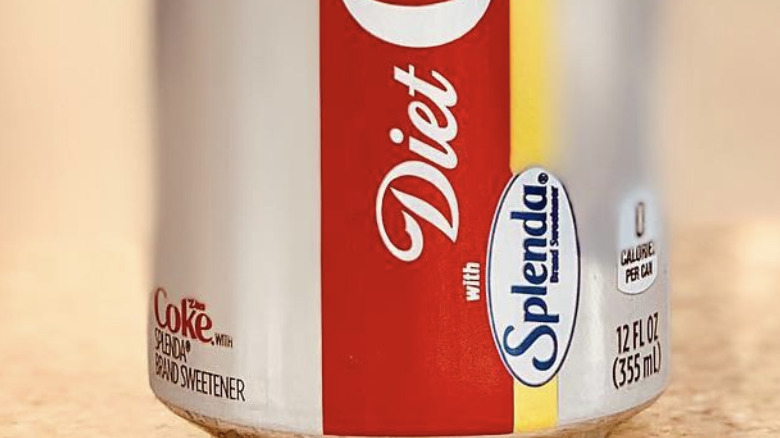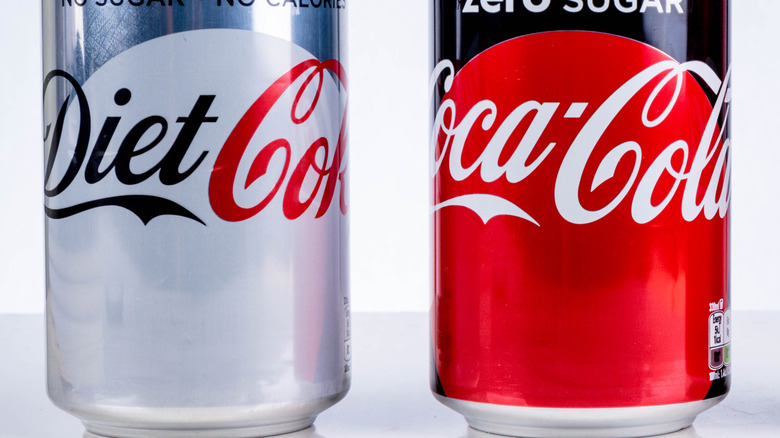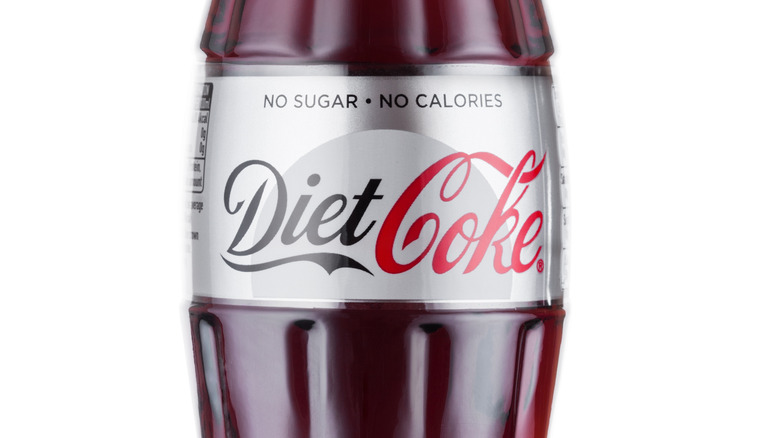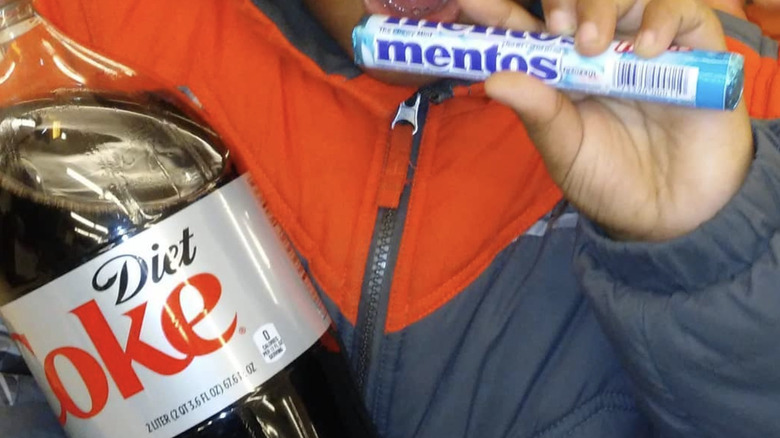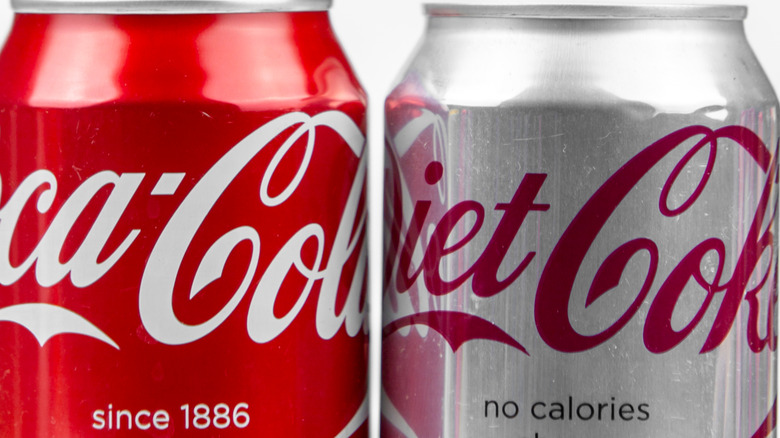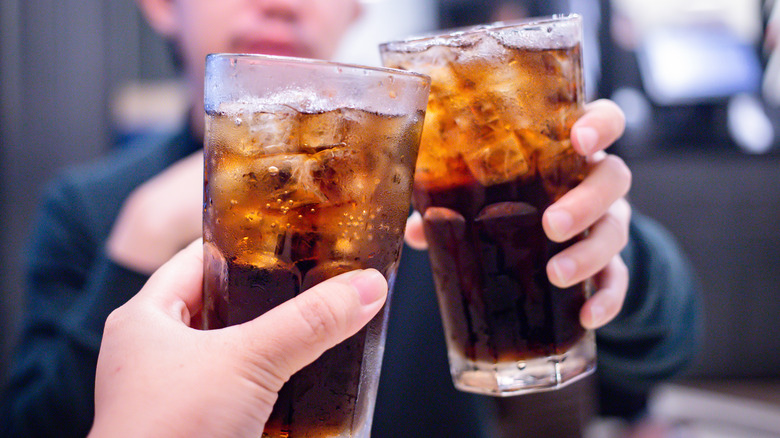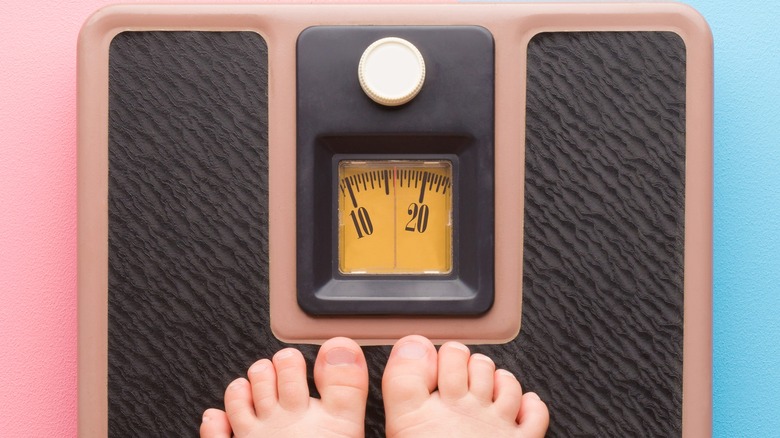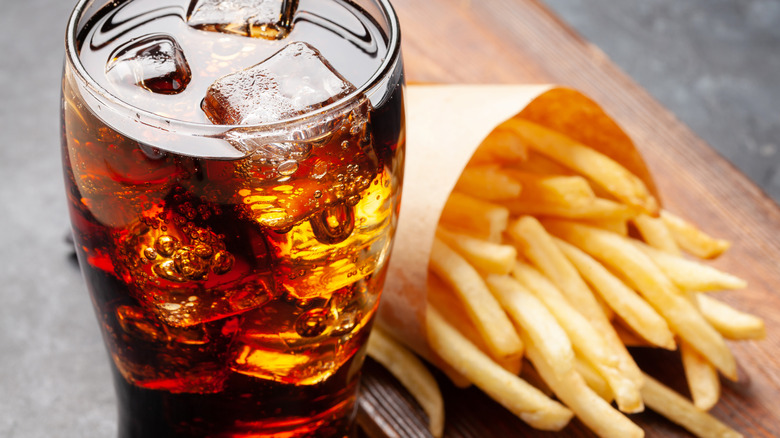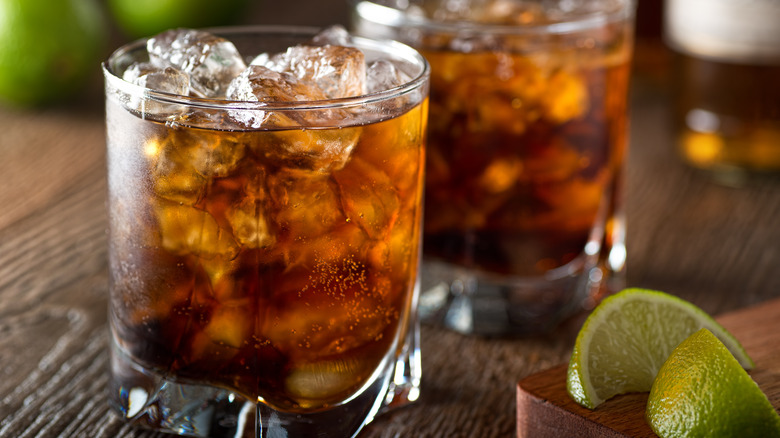What You Need To Know Before You Drink Your Next Diet Coke
Probably the only soda more famous than Diet Coke is Coca-Cola, the immensely popular and widely consumed beverage from which it was spun. The irresistible and sweet zero-calorie cola may feel like it's been around forever, but it's a relatively recent addition to the soft drink scene, launched in 1982. Diet Coke can be considered a marvel of modern food science and chemical engineering mixed with the rise of diet culture and widespread acceptance of dietary needs. It offered a reasonable facsimile of Coca-Cola, but safe to drink for people who couldn't or wouldn't drink sugar, like the health-conscious or people with diabetes. Today, this biggest brand in sugarless beverages is sold virtually everywhere else where original Coke can be found.
At this point, 40 years on, Diet Coke is as much a part of the general culture as it is a packaged food product, available virtually everywhere (unless the institution has a contract with Pepsi). But how much do we really know about this beverage that millions consume like it's a bad habit? Here's a deep and not-so-sweet look into the history and health issues surrounding Diet Coke — which you might want to know before you crack open another can that's been chilling in the fridge.
Diet Coke was the result of years of waiting, work, and research
Diet Coke was nowhere near the first sugar-free cola. According to the Baltimore Sun, RC Cola's Diet Rite debuted in 1958, followed by Coke's own Tab in 1963, and Diet Pepsi a year later. Coca-Cola didn't place its lucrative "Coke" name and seal of approval on a product for so long because it was working to get just the perfect drink on which to do so and avoid the problems faced by other diet drinks. In the 1970s, for example, diet sodas raised alarm because most of them were sweetened with cyclamates — briefly banned by the FDA when evidence suggested it was a carcinogen — and saccharin, which left a terribly bitter aftertaste in diet cola.
According to the Coca-Cola corporate website, the company slowly worked on a formulation for close to two decades, ramping up efforts in 1980, when colas made up 60 percent of the American soft drink market but the fastest growing market category was diet beverages. Executives initially planned to name the beverage "Diet Coke," but considered "Sugar Free Coke," eventually rejecting it because they didn't want to call negative attention to regular Coca-Cola. When it hit stores in 1982, however, Diet Coke was known as diet Coke — per the direction of Coca-Cola's trademark lawyers. They theorized that an uppercase "D" was a noun, like Coke, while a "d" would be an adjective, following the trademark of Coca-Cola to the literal letter.
Diet Coke with alternate fake sugar is available
The development of the calorie-free, sugar alternative aspartame — sold under the brand name NutraSweet — made Diet Coke possible in the early 1980s, and it also threw open the doors on the market for artificial sweeteners. Sucralose originated in a lab in 1976 (according to Saveur) and is 600 times sweeter than a comparable portion of sugar, but didn't take off with the general public in 1992 until it hit stores in the form of individual serving packets marketed under the name Splenda.
Boxes of shelf-stable Splenda — a popular addition to coffee and tea — sold so well that Coke figured its customers would be interested in a diet soda sweetened with sucralose. In 2005, Coca-Cola unveiled a special line called Diet Coke Sweetened with Splenda (although it also got its punch from artificial sweetener acesulfame potassium, or Ace K). Sold primarily at first and in large quantities at Walmart — who approached Coca-Cola with the idea because it moved a lot of Splenda in its retail stores, according to the New York Times — the product sat by side on store shelves next to traditional Diet Coke before fading into obscurity. It's still produced, just hard to find by those who warmly embraced it nearly two decades ago.
What's the difference between Diet Coke and Coke Zero Sugar?
With Diet Coke well established as the Coca-Cola Company's flagship sugar-free product, it introduced numerous diet drinks over the ensuing decades, most notably Coke Zero in 2005, later renamed Coke Zero Sugar to better emphasize its major dietary selling point. More closely adhering to the classic Coca-Cola recipe, but with calorically negligible artificial sweetener in place of sugar, it tasted much more like a real Coke than Diet Coke ever did, because its predecessor came up via its own original, proprietary formula.
While their flavors and sweetener blend are decidedly different, at a chemical level, Diet Coke and Coke Zero Sugar are virtually identical drinks. According to The Sun, Diet Coke and Coke Zero have the exact same molecular makeup — except for one ingredient that apparently makes all the difference. Diet Coke is made with citric acid (vitamin C), while Coke Zero contains a zippy-flavored chemical named sodium citrate.
The Diet Coke formula will stay the same for the time being
The creation of Coke Zero Sugar isn't the first time that Coca-Cola used Diet Coke as a jumping-off point. In 1985, the company launched New Coke, a reformulation of Coca-Cola that quickly flopped with angry and loyal Coke drinkers, according to History. The recipe used was an offshoot of Diet Coke, with high fructose corn syrup going into the mix instead of aspartame, according to HuffPost.
New Coke stuck around until 1992 under the name Coke II, but Coca-Cola was left reeling and humiliated by the public relations disaster of unnecessarily revamping its treasured and famous signature product. The company learned a certain lesson, one that still resonated more than 30 years later. According to CNN, Pepsi changed up the Diet Pepsi formulary in 2015, taking out the aspartame in favor of Splenda and Ace K. And despite falling sales and increased in-house competition from its own Coke Zero, Coca-Cola executives don't seem keen on toying with Diet Coke and have no plans to do so.
The only major alteration to Diet Coke in recent years is the 2008 removal of E211, or sodium benzoate, a fizz-preserving additive that research indicates can lead to behavioral issues or warp into a carcinogen (per Prepared Foods).
Why Diet Coke and Mentos cause an eruption
A simple science experiment became a viral hit in the early days of YouTube back in 2006, depicting a couple of guys in lab coats dropping Mentos mint candies into a container of Diet Coke and observing the cascading eruption of liquid waves that results. Easy and fun to replicate, plenty of schools did their own Diet Coke-and-Mentos experiments, which could really make a person wonder just what kind of chemicals are present in the commonly and frequently consumed soft drink to create such a volatile reaction.
What makes the eruption possible is the abundance of carbon dioxide in Diet Coke, according to Scientific American — the same stuff that can lead to belching. Dissolved carbon dioxide gas is present in the soda, and it bonds with water. Bottles and cans are pressurized, keeping the gas inside the liquid solution. When opened, some of that gas floats into the air, and some of it creates the head of foam, but the majority remains stuck in the Diet Coke by the beverage's surface tension. A Mentos disc is coated in rough, tiny bumps, which break the bonds between carbon dioxide and the water that imprisons it — creating a volcano of cola.
Why Diet Coke doesn't produce that sinking feeling
Diet Coke and regular Coca-Cola are both the sum of a lot of complicated science. There are differences between the two, beyond sugar and calorie content, and on that scientific level. Case in point: A can of Diet Coke and a can of Coke both contain 12 ounces of fluid, but the Diet Coke actually weighs less than the Coke, meaning it will float to the surface if placed in water while its full-calorie counterpart will sink, according to Business Insider.
It all has to do with the relative densities of the liquids and the sweeteners inside of them. A Coke contains 39 grams of sugar; the Diet Coke is made with the sugar substitute aspartame, which grain for grain is so much sweeter than sugar — about 200 times sweeter, according to the FDA — that Coca-Cola bottlers don't have to use as much. The resulting liquid called Diet Coke winds up with a density less than that of water, which makes it float. All that sugar weight in the Coke is what makes it sink (and also why they're so much more filling than a diet beverage).
Diet Coke could damage teeth
It's common medical knowledge, drilled into our collective brains since childhood, that sugar rots your teeth, and that regular brushing cleans off most of those hungry and destructive molecules before tooth decay can begin. It really is true, according to Healthline — sugar works in concert with bacteria to form an acid that wears away at protective tooth enamel, leading to cavities. It would stand to reason that to avoid tooth rot brought on by sugary soda, drinking sugar-free soft drinks like Diet Coke would make for a more dental health-friendly alternative. But according to recent research, that's a potentially dangerous fallacy. In 2015, the University of Melbourne's Oral Health Cooperative Research Centre studied test subjects' molars after the application of 15 different drinks, among them milk, a sports drink, traditionally sugar-sweetened sodas, and three separate diet sodas. The findings concluded that sugary pop and sugar-free pop were responsible for roughly the same amount of damage to tooth enamel.
Researchers singled out Diet Coke as one of the worst enemies of teeth. It contains phosphoric acid, a known eroding agent of tooth enamel. But while Diet Coke was found to decrease the instances of cavities (versus regular soda), the inclusion of phosphoric acid will ultimately cause just as much decay as the sugary soft drinks would.
Diet Coke could cause weight gain
It's extremely counterintuitive and goes against everything Diet Coke has led us to believe about itself and how it affects us, but research indicates that the fizzy soft drink could lead to unwelcome and unexpected weight gain — even though it has virtually no calories (versus the sugar-derived, 140 or so nutrition-free calories of original Coca-Cola). It's even right there in the name — Diet Coke. But math and statistics don't lie, and a 2015 study published in the Journal of the American Geriatrics Society (via Science Daily) uncovered a striking correlation between the consumption of common diet sodas like Diet Coke and obesity among people aged 65 or older. Researchers tracked, monitored, and measured 749 people, and found that the test subjects who drank a moderate amount of Diet Coke experienced an increase in their waist circumference — about triple that of other test subjects who didn't drink diet colas at all.
Indirectly then, Diet Coke could lead to health issues generally associated with advanced weight. The study's findings included the assertion that those people who drank diet soda most often suffered from abdominal obesity, increasing their risk for cardiovascular and metabolic problems as they aged.
Diet Coke and fries aren't a match made in metabolic heaven
According to a 2018 study by Yale University researchers, a strange and potentially less-than-healthy metabolic reaction can be triggered inside the brain by sugar-free soft drinks like Diet Coke — specifically when the carbohydrate-free and calorie-free beverage is paired with carb-and-calorie-laden French fries, a meal served millions of times a day in fast food restaurants and diners around the world. Per the research led by Dr. Dana Small, the combination of consuming real carbohydrates and artificial ones (in the form of carb-free sugar substitutes, like the aspartame found in Diet Coke) serves to confuse the brain in how it tells the body to process and metabolize the food. As the brain senses the true sugars in the potatoes, it doesn't fully or readily understand the fake sugars but tries to process them as if they were real, leading the body to poorly and slowly metabolize. If this happens a lot — like if a person takes a Diet Coke with their fast food combo often — the body suffers because it can't fully process nutrients.
But it's not too late to cut off this repeated practice. Small told Inverse that diet drinks should be consumed on their own rather than alongside meals. The idea is to give your body a better chance at processing it properly.
Diet Coke can make alcohol stronger
Original recipe Coca-Cola is a classic ingredient in many classic cocktails, including the Long Island Iced Tea, the Whiskey and Coke, and the Rum and Coke. Those mixed drinks can also be prepared with Diet Coke to hold back on sugar and calories while also providing an unexpected side effect — the synthetically-sweetened soft drink can serve to make the alcohol stronger. A study published in Drug and Alcohol Dependence in 2015 uncovered a connection between sodas sweetened with artificial sugar substitutes (such as Diet Coke) used in mixed drinks led to a higher concentration of alcohol in the breath of test subjects. The calories in regular Coke act like food in the stomach, which according to common wisdom, slows the rate at which alcohol enters the bloodstream. Because there is no sugar, and thus no calories, in sodas like Diet Coke, the booze hits the blood, brain, and body that much faster and harder.
This is the maximum amount of Diet Coke you should drink each day
It's easy to knock back several cans or bottles of Diet Coke in one day. After all, it's sweet, fizzy, caffeinated, and not-filling because it's calorie-free. Because of that, there's a common perception that diet soda is healthy, or at least healthier than non-diet soda. But according to a 2019 study published by the medical journal JAMA International Medicine (via the New York Times), that common wisdom isn't true at all. After tracking 450,000 Europeans for 16 years and carefully noting their soda consumption preferences, the subjects who routinely drank diet soft drinks had a 26 percent increased risk of early death compared to those who rarely or never consumed diet soda. Drinking sugar-packed soft drinks isn't really healthy either: The study found that those who drank regular sodas on the regular risked an 8 percent increased risk of premature death.
The science is there: You can enjoy your soft drinks, but Diet Coke is best in moderation. With the diet version specifically, the FDA recommends limiting the consumption of caffeine and aspartame, the sugar substitute used in Diet Coke. According to the government agency, adults shouldn't consume more than 400 milligrams of caffeine each day, and 50 milligrams per kilogram of body weight a day in aspartame. With 46 milligrams and 200 milligrams of caffeine and aspartame in a can of Diet Coke, respectively, an adult of 165 pounds (75 kilograms) is pushing it with eight servings daily.
